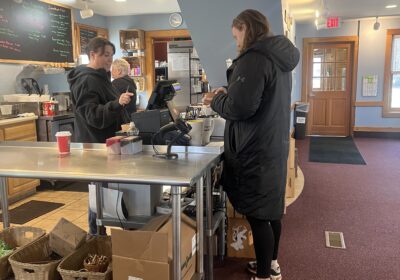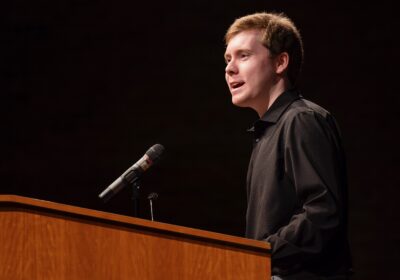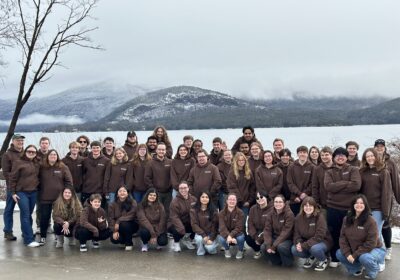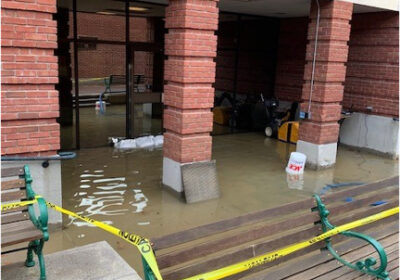International students struggle to find jobs

Paolo Loli, a student from Peru, works at his job in IT services. International students find it is hard to find jobs around campus because their options are so limited.
You are in a new world and everyone around you is speaking a different language. The only things that you have to your name are what you can fit into two suitcases. You also have a set amount of money, and you think it will last you for the whole semester.
But when school starts, professors in various classes tell you that you need to buy this book, paper, pens, folders, and you see you’re seeing the list growing and your money dwindle. At the end of all the purchases, you are left with $15 or in some cases – nothing. What do you do?
“I know,” you say. “I’ll get a campus job.”
While that solution may work for most students at Castleton University, it’s a lot harder for exchange students like to Camille Moraux-Pizano and Quentin Barthe.
When Moraux arrived at Castleton, she was told that her books would be paid by her scholarship, only to learn two weeks later that she had to pay for them herself. All of the money that she came with had to go toward her books. After that she was very nervous.
“I didn’t realize I could have a job at that point, so I had to ask my mom to send me some money and then I started to do some research for the jobs,” she said.
She always wanted to be a librarian, so she emailed the Castleton head librarian, who responded saying it was not possible because they did not take international students.
After looking on the Castleton website reading about the information, she feared that she would not meet the requirements for other on-campus jobs either.
Now into her second semester, Moraux is working as a French tutor for some income. However, she is struggling because students in French classes either do not know that she is tutoring think they have to pay or believe they do not need a tutor.
“I think it would be interesting for students if they had a mandatory meeting once in a semester with someone who is fluently speaking the language,” she said.
Moraux said she would like to see the school taking more initiatives to let future international students know what resources are available to them, especially in January.
Quentin Barthe, now a CA who has been a student at Castleton for two years, had similar job difficulties when he first got to campus from France. Due to visa restraints, he could not work off campus and so he needed to find a job at the university. He went to go see Deborah Singiser, director of International Student Services, to ask for help and to find out what jobs were available to him.
Barthe applied to admissions office to give tours and to be a ball boy for soccer or football games, but he didn’t get either position.
“I was probably too late, every time,” he said.
Barthe even had a friend who was quitting at the bookstore and tried to offer the position to him, but Barthe was fourth on the list.
“Too many students applying for jobs on campus, that’s the reason why I didn’t get the job,” he said with disappointment in his voice.
Barthe kept on applying for just about anything he could think of when his friends and a faculty member told him to try out for being a CA.
It was a long and grueling process with team building exercises and activities to make the in-training CA’s think outside the box. When the interviews and activities were all done, it took over two weeks to notify him he had gotten the job.
Even though he is excited that he has a job now and is no longer worried about an income, he still feels that Castleton is lacking in the job field for international students.
He said there should be jobs solely for international students.
“It’s really hard for some of them to just get a job, while for American people it’s like ‘Oh I know I’m going to get a job this semester.’ They know where to look and most international students don’t,” he said. “They don’t even know they can get a job.”
Barthe would love to help spread the word that international students can get a job, that they are out there, and he wants to help upcoming students.
Freshman Rasmus Funch Pedersen, said the school provided him the right information about on-campus jobs right off, telling him to go see Deborah Singiser and Patrick Liu. But, in this first semester, Pedersen is looking toward adapting, fitting in, and said in the second semester he’ll look for an on-campus job, maybe the IT Department.
“If we get even more international students after this semester and more and more afterwards, it would be nice to have more jobs,” Pedersen said stroking his beard.
The freshman has spent a lot of money so far in the five weeks of the semester, but he is not worried because he is still getting a paycheck from his job back home.
“For me this first year is just surviving,” he said.
Even though Pedersen arrived for orientation and got all the information he needed in August, for international students who arrived in January, like Moraux, they missed out on what they needed to do for on-campus job application.
Ben Mrowka, a freshman from Australia, feels the university is very comfortable, easy to settle in, and willing to help international students. Having Singiser and Liu from the international student office willing to provide anything the students need is especially helpful, he said.
Mrowka is not actively looking for a job, but has contacted the administration office to see if he can do tours of the campus for extra money. He is working some sporting events on the side.
“I think right now with all the sports jobs available to us, it isn’t a problem. I can see there may be a problem for someone not familiar with sports, as there may not be an abundant of permanent on-campus jobs,” he said.
Located above the Coffee Cottage, Singiser and Liu are willing to guide and support the international students.
Singiser creates, designs, implements, oversees, and evaluates all of the services for the international student population. When she started working at Castleton three years ago, the international student population was around 30 students and today it has doubled.
“Therefore things like on-campus jobs for international student interests for employment has grown,” Singiser said.
Despite the increasing demand, international students are still only allowed to apply for institutionally funded positions that come out of the university’s budget and not apply for federal work study positions, which accounts for most jobs offered here on campus. This is one of the biggest issues that the students are facing.
“It all depends on the university’s budget, but there is no plan to add more jobs to meet the needs of international students,” she said.
In order to help with this problem Singiser mentioned raising awareness to the supervisors who have those jobs and for overseers to go out and make sure the international students know they are eligible to work certain jobs that meet their documentation requirements. She said some believe international students cannot work at all, which is not true and something Singiser mentioned they needed to work on.
International students interested in applying for a job or wanting to know more information should contact or visit Singiser and Liu.






